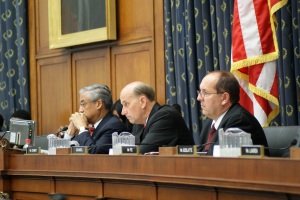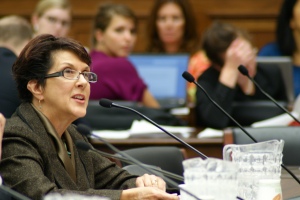Today, Washington State Attorney General McKenna joined Shared Hope International to release the first Protected Innocence Report Card – Washington. The Report Card is based on the Protected Innocence Legislative Frameworkand sets a national standard of protection against domestic minor sex trafficking.
Washington State is blazing a path to protect their children from child sex trafficking. First, bi-partisan leadership from across the state came together to amend the Promoting Commercial Sexual Abuse of a Minor law, which significantly increased penalties for traffickers and buyers of children. Additionally, YouthCare opened the state’s first shelter specifically funded and programmatically designed as a safe haven for child victims of sex trafficking. However, despite these great strides, Washington received a “C”, indicating that it still has significant legislative gaps to close in an effort to create safe environments for Washington’s children.
The embracing of the Report Card by Attorney General McKenna, in spite of the mediocre grade, shows his commitment to advancing Washington’s efforts in strengthening laws that would protect children from traffickers. In December at the National Association of Attorney’s General, Attorney General McKenna challenged his colleagues to take Protected Innocence Initiative back to their states and to make combating child sex trafficking a top priority in 2011.
The Washington Report Card outlines four critical legislative changes needed:
– Amend the state human trafficking law to align with the federal Trafficking Victims Protection Act by eliminate the requirement of force, fraud or coercion in cases of child sex trafficking.
– Amend the patronizing a prostitute law to distinguish the solicitation of a minor with reference to commercial sexual abuse of a minor and/or human trafficking law as the applicable crime and penalty. Currently, the law on solicitation/patronizing a prostitute does not differentiate adults from a minor and is a misdemeanor – regardless of age.
– The Department of Social and Health Services (DSHS) should amend their definition of caregiver to include a “person in control and possession of a sexually exploited child” to bring a child victim of trafficking within the protection of DSHS.
– Amend laws to increase investigative tools for law enforcement by allowing for audio-taping conversations with persons involved in sex trafficking without need for a court order.
Linda Smith commended the work done in 2010, which she recognizes for raising Washington’s grade to the resulting “C”. However, Smith challenges: “We must ask ourselves, is a barely passing grade good enough for our children?” If barely passing isn’t good enough for you, take action by asking several key leaders to uphold their commitment to Washington’s children by strengthening the laws this legislative session!
 Jay-Z’s catchy hit from 2000, hasn’t lost any novelty during its ten year run in the music industry. It even costs $1.29 on iTunes—the price reserved for only the most popular songs within the virtual-jukebox—instead of the standard $.99. In a culture where pimps are idealized as wearing bright orange top-hats, luxurious furs and sporting fancy canes, who wouldn’t want to be “doin’ big pimpin’ up in NYC”? I offer two basic reasons why becoming a pimp can be so appealing in 2010, but please remember, my rudimentary analysis is by no means exhaustive. I simply suggest that the promise of being cool and making lots of money can be a deadly combination that has created an enticing outlet for the up-and-coming commercial sex entrepreneur.
Jay-Z’s catchy hit from 2000, hasn’t lost any novelty during its ten year run in the music industry. It even costs $1.29 on iTunes—the price reserved for only the most popular songs within the virtual-jukebox—instead of the standard $.99. In a culture where pimps are idealized as wearing bright orange top-hats, luxurious furs and sporting fancy canes, who wouldn’t want to be “doin’ big pimpin’ up in NYC”? I offer two basic reasons why becoming a pimp can be so appealing in 2010, but please remember, my rudimentary analysis is by no means exhaustive. I simply suggest that the promise of being cool and making lots of money can be a deadly combination that has created an enticing outlet for the up-and-coming commercial sex entrepreneur. the “ghetto-fab” lifestyle. Just ask Border’s bookstore sales representative Margaret Rhatican about her experiences working in a place where you are sure to find the story of A Pimp’s Life within a series of books about “working the streets.” Just in case one needs a little extra guidance, Amazon offers The Pimp Game: Instructional Guide for pimps in training. In the world of cinema, movies like
the “ghetto-fab” lifestyle. Just ask Border’s bookstore sales representative Margaret Rhatican about her experiences working in a place where you are sure to find the story of A Pimp’s Life within a series of books about “working the streets.” Just in case one needs a little extra guidance, Amazon offers The Pimp Game: Instructional Guide for pimps in training. In the world of cinema, movies like  A pimp is not only a member of the “awesome-elite,” he’s rolling in the dough. It’s the most secure job in an un-secure economy. It’s “recession proof,” says Linda Smith in her book
A pimp is not only a member of the “awesome-elite,” he’s rolling in the dough. It’s the most secure job in an un-secure economy. It’s “recession proof,” says Linda Smith in her book What can be done to take the glitter and glamor out of the pimp-life? Change the vernacular. Searching the words trafficker, rapist, or abuser does not elicit the same Google images of fur, hats, and fancy canes as the pimp search, but instead, reveals truer depictions of the atrocity associated with each term. This necessary shift will take time and a complete transformation in society’s ingrained perceptions. Would a different approach that could act as a catalyst for such a change be more effective? Demi Moore and Ashton Kutcher think it’s possible. They have started a trend focusing on positive reinforcement with the
What can be done to take the glitter and glamor out of the pimp-life? Change the vernacular. Searching the words trafficker, rapist, or abuser does not elicit the same Google images of fur, hats, and fancy canes as the pimp search, but instead, reveals truer depictions of the atrocity associated with each term. This necessary shift will take time and a complete transformation in society’s ingrained perceptions. Would a different approach that could act as a catalyst for such a change be more effective? Demi Moore and Ashton Kutcher think it’s possible. They have started a trend focusing on positive reinforcement with the “Subcommittee will now come to order, and I am pleased to welcome you [to]…today’s hearing before the Subcommittee on Crime, Terrorism, and Homeland Security. The committee is hearing Domestic Minor Sex Trafficking and specifically,
“Subcommittee will now come to order, and I am pleased to welcome you [to]…today’s hearing before the Subcommittee on Crime, Terrorism, and Homeland Security. The committee is hearing Domestic Minor Sex Trafficking and specifically, 






